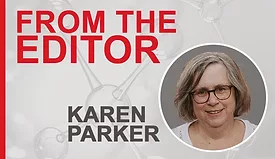Columns
With sustainability increasing in popularity and the carbon footprints of end-to-end supply chains evaluated, innovation and manufacturing will skyrocket.
Read More
Replacing Materials of Concern
Adhesives, sealants, and coatings companies should have a robust protocol in place for determining the optimal replacements for materials of concern.
November 22, 2023
From the Editor
Climate-Driven Extreme Events and the Supply Chain
Climate-related issues, such as El Niño weather events and falling water levels in major waterways, are creating problems for global shipping.
September 25, 2023
FEICA Outlines Position on Packaging and Packaging Waste Regulation
When reviewing revisions to EU packaging and packaging waste regulation, innovative packaging that may not be covered by the design for recycling criteria should be allowed to prove recyclability through testing.
September 20, 2023
PSA Tape Companies Work Toward a Sustainable Future at Tape Week 2023
Tape Week 2023 highlighted innovative solutions to challenges facing pressure-sensitive adhesive (PSA) tape professionals and end users alike.
June 26, 2023
Innovate to Thrive in the Next Decade
Innovation allows companies to achieve higher levels of growth, profitability, employee engagement, and success.
June 23, 2023
Tips for Optimizing Digital Tool Implementation
When creating a strategy for digital tools, companies should review their corporate goals and resources, focus on customer interactions, and balance the risk and reward.
June 21, 2023
Extension of the GRA to Professional Uses to Impact Adhesives and Sealants End-Users
FEICA proposes the development of a European platform for information and training of professional users to cover risks from harmful chemicals instead of a generic ban of substances for professionals.
April 17, 2023
From the editor
Hitting Fast Forward with Digitalization
Digitization makes huge amounts of data available for technologies like artificial intelligence to flourish; it also makes such data available to hostile forces.
February 27, 2023
Proactive Approach to Navigating Transportation Woes
Companies must take a proactive approach to navigating transportation woes and create supply chain capabilities to help them stay a step ahead of the competition.
February 23, 2023
Keep the info flowing with our newsletters!
Get the latest industry updates tailored your way.
JOIN TODAY!Copyright ©2026. All Rights Reserved BNP Media.
Design, CMS, Hosting & Web Development :: ePublishing












